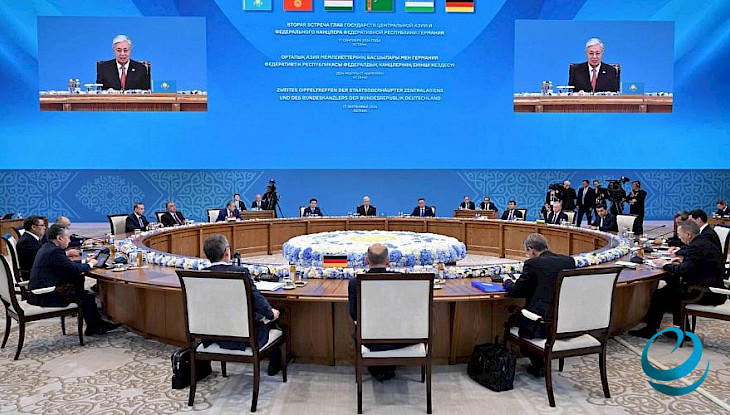The "Central Asia + Germany" summit concluded in Astana, marking an important step in strengthening relations between Central Asia and Europe.
This format, which has gained popularity in recent years, enables the region's countries and Germany to develop common approaches to global challenges, such as economic development, energy, and security.
Economic Initiatives and Infrastructure Projects
One of the key topics of discussion was the development of transport and logistics infrastructure. President of Kazakhstan Kassym-Jomart Tokayev proposed intensifying work on the Middle Corridor, which should connect Central Asia with Europe through the Trans-European Transport Network (TEN-T).
Germany supported this project and allocated €10 billion for its development under the Global Gateway program.
“We are counting on Germany’s assistance in linking this route with the Trans-European Transport Network,” Tokayev noted.
According to him, a new chapter is opening in the history of multifaceted cooperation within the "Central Asia – Germany" format.
“Germany’s socio-economic, scientific, and technological progress serves as a good example for many countries. The positive impact of German technologies and investments in various sectors of the economy cannot be overestimated.
We greatly appreciate Germany’s commitment to developing equal partnerships with all countries in our region.
This is confirmed by the Social Democratic Party of Germany's position paper titled ‘Central Asia: Building Bridges and Creating Opportunities,’” the President of Kazakhstan emphasized.
At the summit, President of Uzbekistan Shavkat Mirziyoyev proposed creating an “Energy Dialogue” between Central Asia and Germany for the joint development of projects in low-carbon economies and “green” hydrogen.
In addition, he emphasized the importance of German companies in the economic development of Uzbekistan and proposed developing a “roadmap” to expand cooperation with partners such as Siemens, BASF, and MAN.
President of Kyrgyzstan Sadyr Japarov focused on large energy and transport projects, such as the construction of the Kambarata HPP-1 and the China-Kyrgyzstan-Uzbekistan railway. According to him, these projects could drive regional development and stability.
“Active work is underway to attract investors and technologies for the construction of this and other hydropower facilities in the republic. Of course, any entrepreneur, before investing in a country, examines the economic aspects, legislation, security issues, and guarantees for their investments,” Japarov emphasized.
Water Resources and Climate
Environmental and water resource issues also took center stage in the discussions. Kazakhstan, as the chair of the International Fund for Saving the Aral Sea, proposed stepping up cooperation on projects aimed at saving the Aral Sea.
“The Fund’s activities are crucial for ensuring sustainable development and prosperity in our region. Particularly relevant is the initiative to establish a Regional Center for Sustainable Agriculture. I expect that this initiative will be supported by all participants of today’s meeting,” the leader of Kazakhstan stated.
Germany supported this proposal and expressed readiness to assist in the "green" transition and the development of sustainable agriculture.
President of Tajikistan Emomali Rahmon added that the development of water and energy infrastructure remains important for his country, noting Tajikistan’s potential in renewable energy sources.
He also drew the summit participants' attention to the development of cooperation in cultural and humanitarian fields, education, and workforce training for various sectors of the economy.
Security and Stability
Amid global geopolitical challenges, Central Asian leaders also discussed security issues.
President of Turkmenistan Serdar Berdimuhamedov emphasized strengthening partnerships with German companies in energy and infrastructure, highlighting that such projects would help not only economic development but also regional stability.
Additionally, the importance of joint efforts to combat terrorism, extremism, and cybercrime was stressed, reaffirming the countries’ commitment to ensuring security in the region.
President of Kazakhstan took the opportunity to wish Kyrgyzstan success in promoting its candidacy for a non-permanent seat on the UN Security Council for 2027-2028. “I am confident that Kyrgyzstan can make a significant contribution to strengthening stability and security in Central Asia and beyond,” Tokayev emphasized.
Final Declaration: A Step Forward in Cooperation
At the conclusion of the summit, a joint declaration was signed, formalizing agreements on a range of issues: the development of transport and energy projects, cooperation on water resources and environmental issues, and joint efforts to address global challenges, including security issues.
Germany reaffirmed its readiness to support Central Asian countries on their path to sustainable development, while regional leaders expressed their desire to deepen integration with Europe.
Thus, the "Central Asia + Germany" summit confirmed the strategic importance of this format for both sides and laid the foundation for further deepening cooperation in the face of global challenges.
CentralasianLIGHT.org
September 17, 2024

